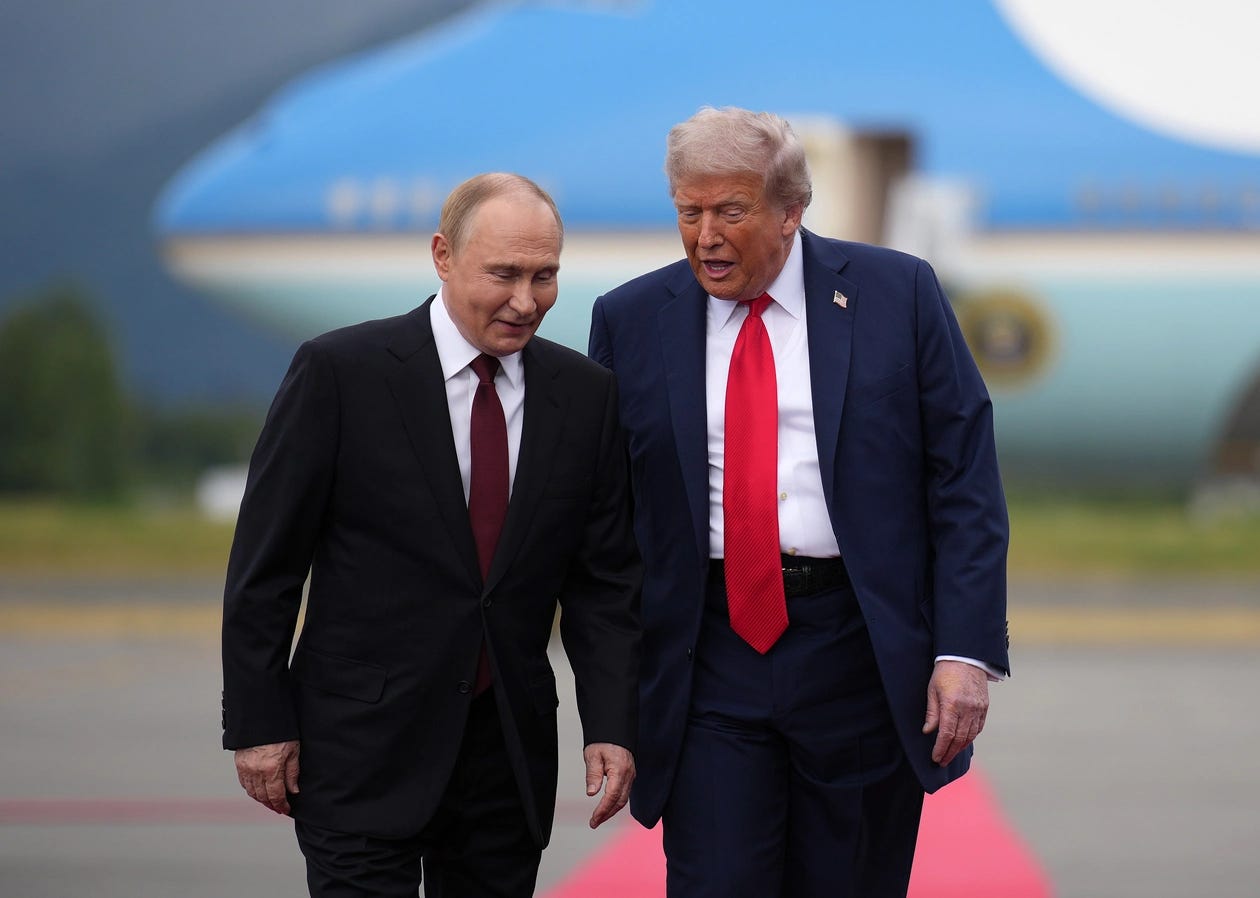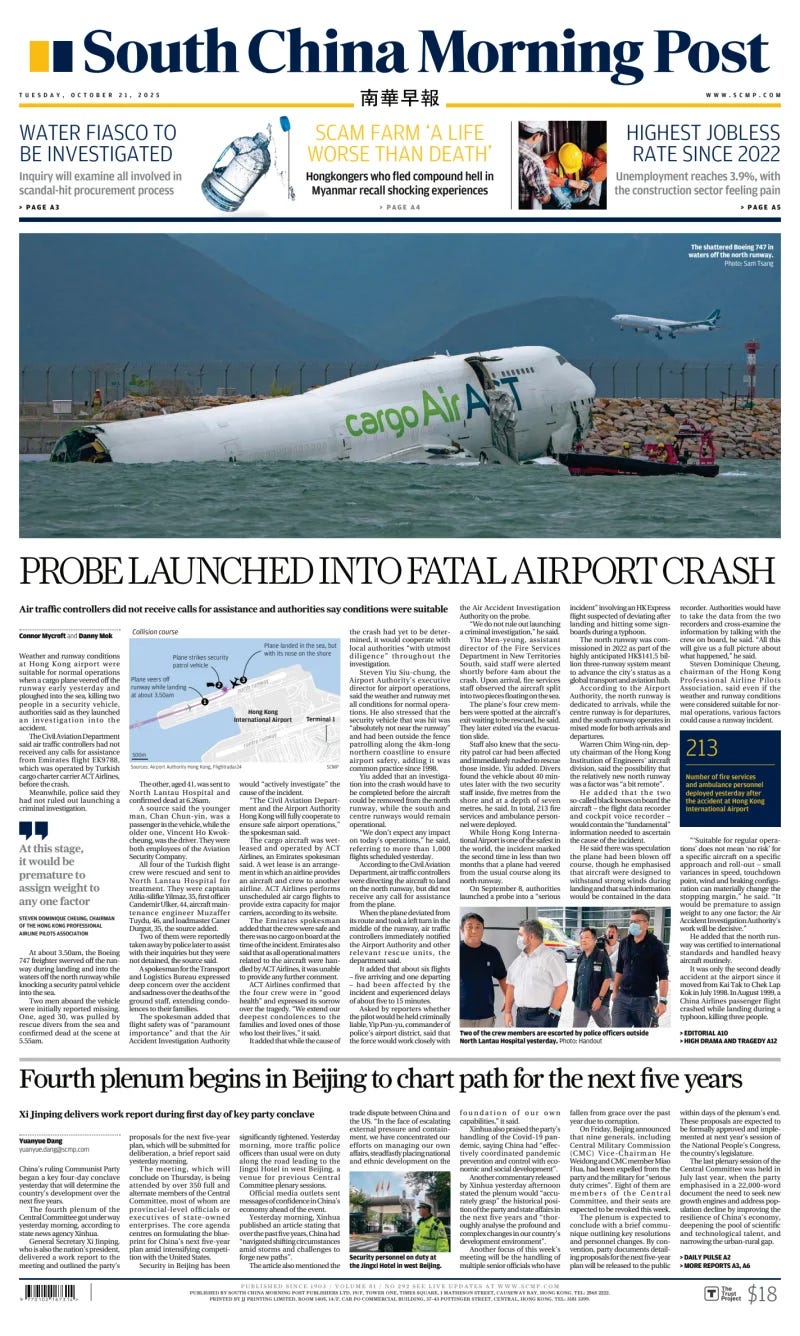Trump–Putin Summit Axed: The Flight Path to a Distant Peace Crashes Mid-Air
After days of hype and hope, Washington abruptly cancels the Budapest summit as Moscow pushes its maximalist war aims & the Gaza peace deal that emboldened Trump starts to fray under renewed violence
Good evening from Odesa. In tonight’s World Briefing, we start with the abrupt cancellation of the anticipated Trump–Putin summit in Budapest — a meeting that was meant to cement the U.S. president’s self-styled role as global peacemaker. The decision, coming just days after Moscow doubled down on its maximalist war aims, raises new doubts about whether Trump’s “deal diplomacy” can extend beyond his Gaza breakthrough.
President Donald Trump’s second summit with Russian President Vladimir Putin is off. The White House said Tuesday that the planned meeting in Budapest, announced by Trump just last week after his two-hour phone call with Putin, was no longer in the works after Secretary of State Marco Rubio spoke Monday with Russian Foreign Minister Sergey Lavrov. “Secretary Rubio and Foreign Minister Lavrov had a productive call,” said a White House official granted anonymity to discuss the plans. “Therefore, an additional in-person meeting between the Secretary and Foreign Minister is not necessary, and there are no plans for President Trump to meet with President Putin in the immediate future.” The rapid dissolution of plans for another summit between Trump and Putin just two months after they met in Alaska stemmed again from Russia’s refusal to budge from its maximalist positions on what it would take for it to halt its war in Ukraine. In a press conference in Moscow Tuesday, Lavrov said he informed Rubio that Russia’s position — that a peace agreement must come before a ceasefire in its war with Ukraine — has not changed. “I believe American officials have concluded that Russia’s position has remained largely unchanged over time and remains within the bounds of its initial maximalist demands,” Lavrov said. “Russia has not altered its positions compared to understandings and prolonged negotiations between Putin and Trump in Alaska.” Russia has long called for the elimination of the “root causes” of the war in Ukraine, claiming that its growing alignment with Europe and desire to join NATO amount to an existential threat. Putin has questioned the legitimacy of Ukrainian President Volodymyr Zelenskyy and urged new elections in Ukraine, called for the end of the so-called persecution of Russian speakers and demanded that Ukraine doesn’t join NATO. He frequently peppers his speeches on Ukraine with unsubstantiated claims that the country is filled with “Nazis.” “We remain entirely committed to this formula and I confirmed it yesterday in the conversation with Marco Rubio,” Lavrov said. Lavrov also questioned how Putin would fly to Budapest, given Poland’s threat to execute the International Criminal Court’s active arrest warrant if Putin flies inside its airspace - Politico
The president’s diplomatic breakthrough in the Middle East earlier this month bolstered his own confidence in his peacemaking capabilities and, he and aides had hoped, could generate newfound momentum in negotiations to end the war between Russia and Ukraine. But the Gaza peace agreement is being tested as new violence has broken out between Israel and Hamas. And Putin continues to make clear that, despite a willingness to engage with the White House, Russia is not interested in ending the war - Politico
Watch my live interview on CNN this evening — commenting from Odesa with anchor Isa Soares on her prime-time show — as we unpack the abrupt cancellation of the Trump–Putin summit. I opened by noting that after the two egomaniacs had already compared the size and range of their flying palaces in Alaska, many were curious to see how Mr. Putin might have navigated banned EU airspace… perhaps even to the day when the pair would share a bowl of Hungarian goulash in Budapest.
A group of dozens of officials from across the federal government, including U.S. intelligence officers, has been helping to steer President Donald Trump‘s drive for retribution against his perceived enemies, according to government records and a source familiar with the effort. The Interagency Weaponization Working Group, which has been meeting since at least May, has drawn officials from the White House, the Office of the Director of National Intelligence, the Central Intelligence Agency, the Justice and Defense Departments, the Federal Bureau of Investigation, the Department of Homeland Security, the Internal Revenue Service and the Federal Communications Commission, among other agencies, two of the documents show. Trump issued an executive order on his inauguration day in January instructing the attorney general to work with other federal agencies “to identify and take appropriate action to correct past misconduct by the federal government related to the weaponization of law enforcement and the weaponization of the Intelligence Community.” The existence of the interagency group indicates the administration’s push to deploy government power against Trump’s perceived foes is broader and more systematic than previously reported. Interagency working groups in government typically forge administration policies, share information and agree on joint actions. The interagency group’s mission is “basically to go after ‘the Deep State,’” the source said. The term is used by Trump and his supporters to refer to the president’s perceived foes from the Obama and Biden administrations and his own first term - Reuters
President Donald Trump has begun demolishing the traditional work space of First Lady Melania Trump and her staff to make way for his “big, beautiful” ballroom. Two months after unveiling plans to build the 90,000-square foot ballroom, construction crews have begun tearing down the covered entrance of the East Wing, with cranes and backhoes attacking window frames and knocking away parts of the exterior cladding. Dramatic photos and videos revealed the first stage of the transformation on Monday, showing windows of the historic building smashed and ripped off their hinges. The new ballroom is being built in the East Wing, which has long housed the offices for the first lady, whose staff have been temporarily relocated to other parts of the White House complex. The Daily Beast has reached out for confirmation as to where they are currently working from. It is internally connected through the East Colonnade to the Executive Residence, where presidents and their families have traditionally lived. The ballroom is merely the latest sign of the president remodeling the White House in his image. Since returning to power in January, Trump has also redecorated the Oval Office with gold accents and ornate frames; removed portraits of his predecessors and replaced them with his own; installed two giant flagpoles on the north and south lawn; and paved over the grass in the Rose Garden to create a white patio filled with tacky Mar-a-Lago chairs and tables - The Daily Beast
The World Food Programme (WFP) and Gaza’s authorities have warned that humanitarian aid entering the enclave remains critically below agreed levels, as Israel continues to restrict crossings despite a ceasefire meant to ease the humanitarian crisis. WFP spokesperson Abeer Etefa said on Tuesday aid flows into Gaza are “far short” of the daily target of 2,000 tons needed to sustain the population. “To be able to get to this scale-up, we have to use every border crossing point right now,” she told reporters in Geneva, noting that only the Kerem Shalom and Kissufim crossings are operational. Access to northern Gaza — where famine conditions persist — remains entirely closed. The Gaza Government Media Office said only 986 trucks have entered the enclave since the ceasefire took effect, far below the 6,600 trucks agreed upon in the deal. “On average, just 89 trucks have entered Gaza daily — out of the 600 that were supposed to enter each day,” the media office said in a statement, calling the restrictions evidence of “Israel’s continued policy of suffocation, starvation, and humanitarian blackmail imposed on more than 2.4 million residents.” The office added that 14 trucks carrying cooking gas and 28 trucks with solar fuel entered Gaza for bakeries, hospitals, and other essential services, but said these supplies “fall drastically short” of meeting the enclave’s urgent needs. Palestinian government in Gaza called for the immediate and consistent entry of at least 600 trucks daily, including food, medical supplies, fuel, and relief materials, to “secure the basic necessities of life with dignity.” - TRT World
Hamas said it will release the remains of two Israeli hostages at 9:00 p.m. on Tuesday. This comes shortly after US President Donald Trump stated that he would send forces into Gaza to “straighten out our Hamas” if it did not abide by the ceasefire agreement. Currently, the remains of 15 hostages continue to be held by Hamas in Gaza. Hamas claimed on Thursday that the return of Israeli hostages’ remains may take time, as some were buried in tunnels destroyed by Israel, and others remain under the rubble of buildings that Israel. The retrieval of the remaining hostages required equipment to remove rubble, which was currently unavailable due to Israel’s ban on entry of such tools, Hamas added. “We know for certain that Hamas can easily release a significant number of hostages in accordance with the agreement. What they are doing now is a fundamental violation of that agreement,” Foreign Minister Gideon Sa’ar said. - Jerusalem Post

Prague will ban electric scooters next year, making it the latest European city to crack down on the tourist-friendly mode of transport. City councillors adopted a new measure on Monday that will overhaul shared transport rules and govern where bikes, both pedal and electric, can be parked in the Czech capital. Shared e-scooters were omitted from the rules, which will effectively end access to them beginning in January. “The end of electric scooters approved!” Zdeněk Hřib, chair of the national Pirate party and deputy mayor in charge of city transport, said on the social media platform X. “We are introducing clear rules that will clear public space from uncontrolled scooter traffic, which was often used in the city centre more as a tourist attraction than a means of transport and caused chaos on sidewalks and in pedestrian zones,” Hřib added. The citywide initiative follows local efforts to curb the number of e-scooters zipping through Prague. They were already banned in a busy part of the city centre where residents had raised safety concerns. Other European cities have also tightened rules on e-scooters, and Paris and Madrid have banned them entirely - Euronews




